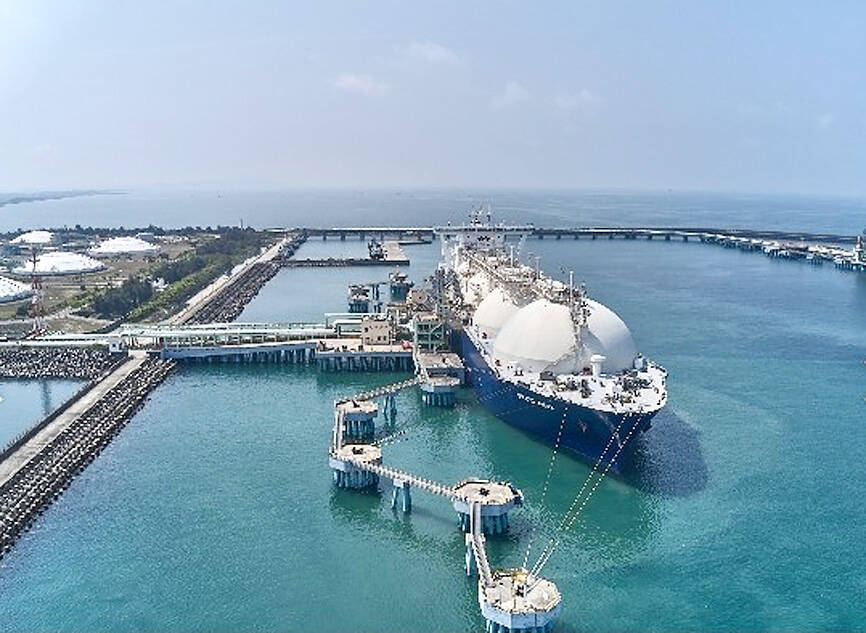The energy sector is the “weakest element” in Taiwan’s potential to resist coercion, the Center for Strategic and International Studies (CSIS) think tank said in a report after conducting a series of war games.
“The overwhelming preponderance of [Taiwan’s] energy must be imported and is thus vulnerable to a blockade,” it wrote in a report dated Thursday.
Although blockading Taiwan to paralyze its energy supply would be risky and costly, that could reduce the nation’s electricity generation to 20 percent of its regular levels, it said.

Photo courtesy of CPC Corp, Taiwan
This would spell paralysis for Taiwan’s manufacturing sector, including for chips that supply the world economy, the CSIS said.
Russia has conducted a similar strategy in its attack on Ukraine’s energy grid, with some success, it added.
The think tank’s conclusions were drawn from 26 simulations of a Chinese blockade on Taiwan, which they said was an attractive option for Beijing.
A blockade could help China pressure Taiwan into capitulating to annexation without risking a bloody and dangerous amphibious assault on Taiwan proper, the CSIS said.
Beijing’s blockade could range from deploying its coast guard to board and inspect vessels, to a full-scale conflict where it launches missile strikes against US and Japanese military bases, it said.
The outcome could be influenced by factors including Taiwan’s ability to bolster its infrastructure, investment in defenses against an invasion, the size of the Taiwanese merchant marine fleet, the lethality of Chinese missiles, Japan’s willingness to assist Taiwan and the potential of the war spreading outside the blockade zone, the CSIS said.
A blockade would pose a severe, but not insurmountable challenge, it said, adding that the most important capability for Taiwan and the US was being able to hire or requisition a vast merchant fleet to supply Taiwan.
Other key capabilities include increasing the number of gas carriers in its possession, replacing insurance companies that are unwilling cover commercial shipping in war zones and energy resilience, the CSIS said.
Taiwan could reduce its dependence on energy imports by building strategic reserves of oil, gas and coal, and maintaining the nation’s last nuclear reactor, it said, adding that the nation’s energy grid should be hardened by measures such as having stockpiles of transformer and turbine spare parts.
The nation would also need a broad set of military capabilities to defend itself, as the weapon systems suited for a “porcupine strategy” against a full-scale invasion would not be useful against a blockade, which requires ships and warplanes, it said.
Taiwan and the US should prepare a “creative menu of offers and responses ahead of time,” as off-ramps for Beijing to declare victory without extracting substantial concessions, the CSIS said, adding that those could include Taiwan agreeing to international observers in customs houses or reiterating the so-called “1992 consensus.”
The “1992 consensus” is a term former Mainland Affairs Council chairman Su Chi (蘇起) in 2006 admitted making up in 2000. It refers to a tacit understanding between the Chinese Nationalist Party (KMT) and the Chinese government that both sides of the Strait acknowledge there is “one China,” with each side having its own interpretation of what “China” means.

US climber Alex Honnold is to attempt to scale Taipei 101 without a rope and harness in a live Netflix special on Jan. 24, the streaming platform announced on Wednesday. Accounting for the time difference, the two-hour broadcast of Honnold’s climb, called Skyscraper Live, is to air on Jan. 23 in the US, Netflix said in a statement. Honnold, 40, was the first person ever to free solo climb the 900m El Capitan rock formation in Yosemite National Park — a feat that was recorded and later made into the 2018 documentary film Free Solo. Netflix previewed Skyscraper Live in October, after videos

Starting on Jan. 1, YouBike riders must have insurance to use the service, and a six-month trial of NT$5 coupons under certain conditions would be implemented to balance bike shortages, a joint statement from transportation departments across Taipei, New Taipei City and Taoyuan announced yesterday. The rental bike system operator said that coupons would be offered to riders to rent bikes from full stations, for riders who take out an electric-assisted bike from a full station, and for riders who return a bike to an empty station. All riders with YouBike accounts are automatically eligible for the program, and each membership account

NUMBERS IMBALANCE: More than 4 million Taiwanese have visited China this year, while only about half a million Chinese have visited here Beijing has yet to respond to Taiwan’s requests for negotiation over matters related to the recovery of cross-strait tourism, the Tourism Administration said yesterday. Taiwan’s tourism authority issued the statement after Chinese-language daily the China Times reported yesterday that the government’s policy of banning group tours to China does not stop Taiwanese from visiting the country. As of October, more than 4.2 million had traveled to China this year, exceeding last year. Beijing estimated the number of Taiwanese tourists in China could reach 4.5 million this year. By contrast, only 500,000 Chinese tourists are expected in Taiwan, the report said. The report

Temperatures are forecast to drop steadily as a continental cold air mass moves across Taiwan, with some areas also likely to see heavy rainfall, the Central Weather Administration (CWA) said. From today through early tomorrow, a cold air mass would keep temperatures low across central and northern Taiwan, and the eastern half of Taiwan proper, with isolated brief showers forecast along Keelung’s north coast, Taipei and New Taipei City’s mountainous areas and eastern Taiwan, it said. Lows of 11°C to 15°C are forecast in central and northern Taiwan, Yilan County, and the outlying Kinmen and Lienchiang (Matsu) counties, and 14°C to 17°C